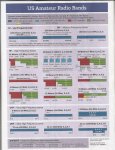Hi All,
Was interested in getting into Morse Code through radio. I would just be receiving (No HAM License yet), and was wondering what frequencies are common with morse code? Also, what scanner, receiver, or radio would you recommend that I buy for me to listen to these frequencies?
- Thanks
Was interested in getting into Morse Code through radio. I would just be receiving (No HAM License yet), and was wondering what frequencies are common with morse code? Also, what scanner, receiver, or radio would you recommend that I buy for me to listen to these frequencies?
- Thanks




